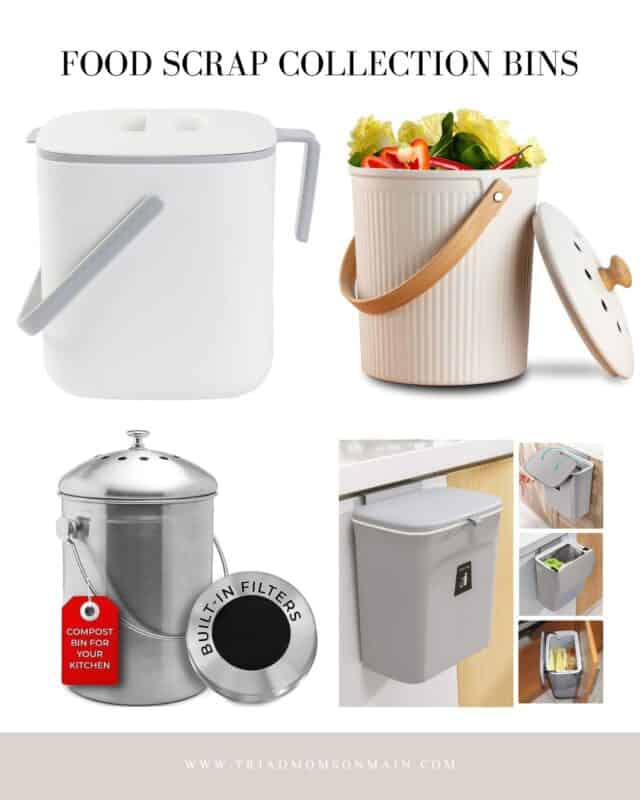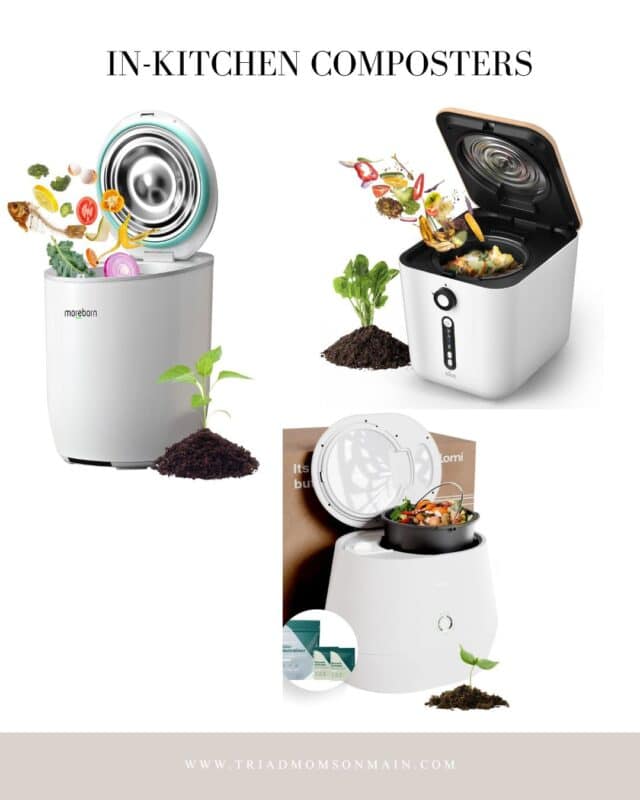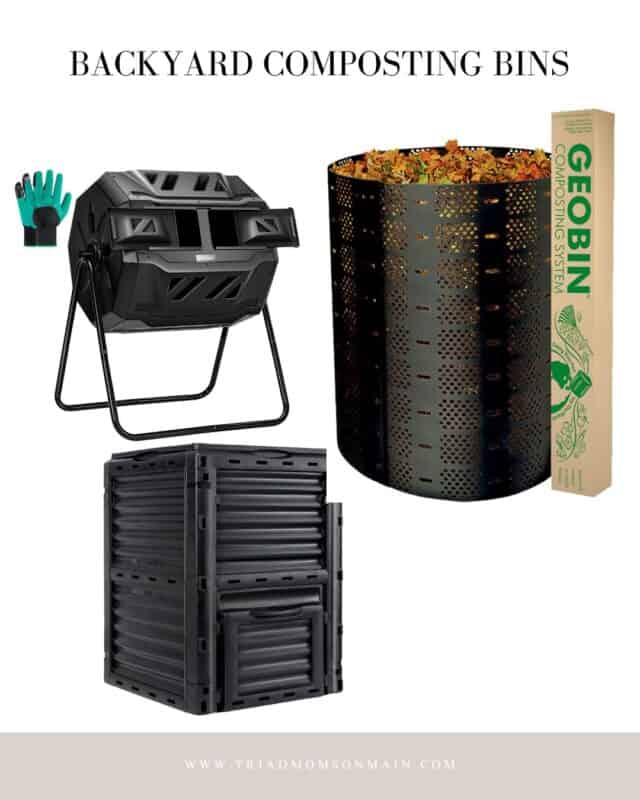Composting For Beginners

Composting is a fantastic way to reduce waste and give back to nature. By turning your kitchen scraps and yard waste into rich soil, you can nourish your garden while also keeping unnecessary trash out of the landfill. Whether you’re looking for easy composting tips or just curious about the composting process, getting started is simpler than you think. Let’s break down what composting is, how to get started, and the basics of keeping a successful compost bin in your backyard.
It makes us SO happy to see that so many people are venturing into the world of composting these days. Composting is helpful because it keeps food out of the landfill — which then results in more methane emissions than any other landfilled materials. By contrast, composting food allows for not just the offset of those methane gases into our environment, but also results in nutrient-rich soil that can be used to grow even more food.
What is composting?
Composting is the natural process of breaking down organic materials like food scraps and plant waste into nutrient-rich soil. This happens through a combination of microorganisms, heat, moisture, and oxygen, which work together to decompose the waste. The result is humus, a dark, earthy material that improves the quality of your garden soil. By adding this to your plants, you’re essentially feeding them a boost of vitamins and minerals. Whether you use a store-bought composter or a DIY compost bin, composting is a simple and sustainable way to help the environment.
How do you compost for beginners?
For beginners, the composting process can be easy and rewarding. Start by setting up a composter or compost bin in a shady spot in your yard. Add materials like fruit and vegetable scraps, coffee grounds, and grass clippings. Layer these with “brown” materials such as leaves, twigs, and cardboard. These brown materials provide carbon, while the green materials add nitrogen, both essential for good composting. Keep the compost moist but not too wet, and turn it regularly to allow air to circulate. In no time, you’ll have a thriving compost pile producing healthy soil.
The good news is, that composting in your home is easier than ever. You can take on the whole process yourself, or outsource it to a local service (we love Triad Compost Service). No matter which composting route you take, we hope you’ll find some composting supplies on this list to make getting started with composting just a little easier!
How long does compost need to decompose?
The length of time compost needs to fully decompose depends on a few factors: the materials used, the size of the pile, and how often it’s turned. In ideal conditions, with a balanced mix of materials and regular turning, compost can break down in as little as two to three months. However, for larger piles or those that aren’t turned often, the composting process can take six months to a year. Don’t be discouraged—good composting takes time. Just remember to keep turning and adding to your pile regularly for the best results.
What are the do’s and don’ts of composting?
There are a few important do’s and don’ts when it comes to composting. Do add fruit and vegetable scraps, coffee grounds, eggshells, grass clippings, and leaves to your compost bin. Do turn your pile regularly to allow air circulation. Do keep it moist but not too wet, and make sure it’s in a shaded area. Don’t add meat, dairy products, or oily foods to your compost pile, as these can attract pests and slow down the composting process. Don’t forget to chop up large pieces of waste, as smaller bits decompose faster. And lastly, avoid adding weeds or diseased plants to your compost.
Composting methods
There are several types of composting methods, depending on your space and needs. Traditional composting is done in a backyard bin or pile, where organic waste naturally breaks down. Vermicomposting uses worms to speed up the composting process, perfect for smaller spaces or even indoors. Another option is hot composting, where heat speeds up the breakdown of materials. This method requires more effort, like frequent turning and careful balance of materials, but it produces compost in a matter of weeks. Choosing the right method depends on how much space you have and how fast you want results.
What can be composted?
Composting is all about balance. You can compost a wide range of organic materials, but it’s important to know what works best. Things like fruit and vegetable scraps, coffee grounds, eggshells, leaves, grass clippings, and even shredded paper can all go into your compost bin. Avoid adding meat, bones, or dairy products, as these can attract animals and cause odor issues. You should also steer clear of pet waste, synthetic materials, and anything treated with chemicals. As long as you stick to the basics, your compost will thrive and produce nutrient-rich soil in no time.

How to make a compost bin
Creating your own compost bin is a simple DIY project that requires minimal supplies. You can use a plastic bin, a wooden crate, or even chicken wire. Make sure the bin has holes for airflow and drainage. Start by placing a layer of coarse materials like straw or twigs at the bottom. Then, alternate between green materials (like food scraps) and brown materials (like leaves and cardboard). Keep the bin covered to retain moisture, but allow it to breathe. If you want easy composting, a tumbling composter can also be a great option, as it allows you to rotate and mix the materials with ease.
Food Scrap Collection Bins & Bags
Regardless of your approach to composting, you’ll want to have some bags on hand to make your food scrap collection easier. Depending on your composting container size, here are some small, medium, and larger bag options!
Oh, and since these are also bags we’ll include them here. Once you start composting, it’s great to have some compost-friendly zipper bags on hand (like Ziplocs). Though reaching for reusable glass or silicone containers whenever possible is ideal, there area always situations that call for a disposable option. This makes for a compostable disposable option — definitely preferable over more single-use plastic headed to the landfill!
And speaking of your composting container…we’ve rounded up a few kitchen collection bins to consider. Here’s a standard option that looks nice on a kitchen counter. This one is really sleek, and the handle is a nice feature. One neat thing about this bin is that the bin itself was made with sustainability in mind. (It’s made from earth-friendly recycled materials including bamboo fiber and corn starch — so cool!) The fact that this one can hang on a cabinet makes it a different (and countertop space-saving) option, too.

In-Kitchen Composters
It’s been amazing to watch the emergence of at-home (IN-KITCHEN) composters. Now you have an option to compost at home that doesn’t involve any kind of outdoor commitment. Not only is this preferable for some from a mess, equipment, etc. perspective, it also makes at-home composting an option for people who live in an apartment, condos, townhomes, and other areas without much or any yard access.
If you’re looking for an in-kitchen composter, we think this one, this one, or this one would all be great options.

Backyard Composting Bins
If you do have the yard space and the desire to take the more traditional approach to at-home composting, you’ll need some materials for that as well — namely a large bin! This is a great rotating compost bin option for outside. This bin promises to speed up backyard composting, which is a plus. This final outdoor bin is HUGE (236 gallons) and boasts wonderful ventilation to help with the composting process.
Composting is an easy, rewarding process that benefits both you and the environment. Whether you’re using a backyard bin or a store-bought composter, turning kitchen scraps into rich soil can be a fun project for the whole family.
For more of our favorite things, check out our Amazon Store Front. We continuously add new items sorted by category. Plus, want to see more blogs like this and get notifications on local events and happenings? Subscribe to our free weekly newsletters!

